International Cooperation
| Reports - Annual Report on Drug Control in China 2008 |
Drug Abuse
International Cooperation
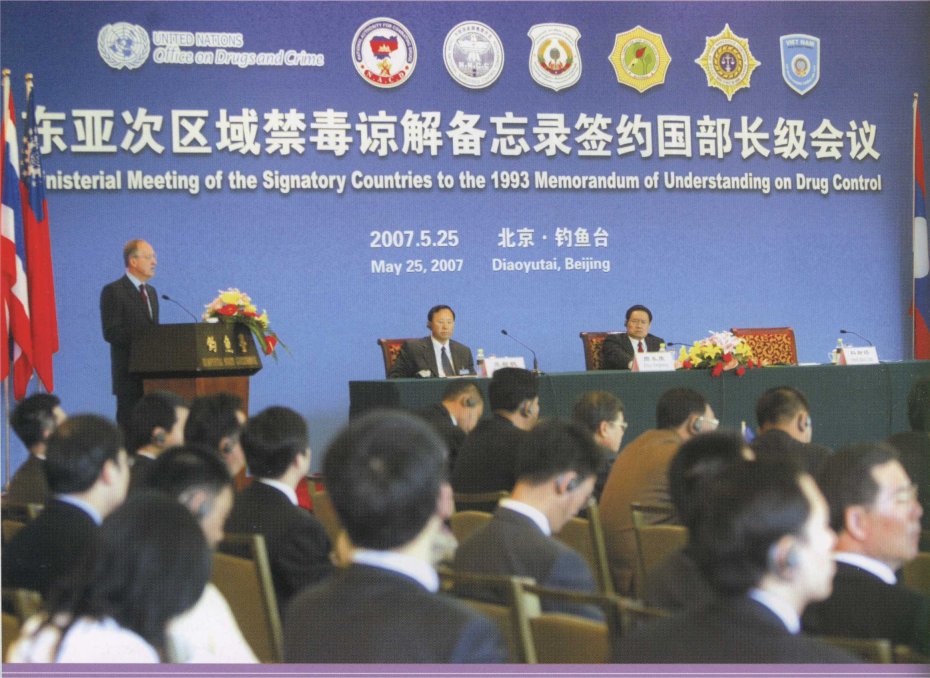
In 2007, NNCC, together with the Ministry of Foreign Affairs, the Ministry of Commerce, the Ministry of Agriculture, etc., continued to strengthen alternative development cooperation with Myanmar, the Lao PDR and other countries, actively strengthened the intelligence exchange and law enforcement cooperation with Pakistan, Afghanistan and other relevant countries, consolidated and enhanced the cooperation with United Nations and other countries. International drug control cooperation achieved positive results.
Taking alternative development cooperation with foreign countries as priority, solving earnestly the drug problems of "Golden Triangle"
According to the unified deployment of the State Council, the Office of NNCC coordinated actively the Ministry of Commerce and the relevant agencies of Yunnan Province, to conduct large-scale opium poppy alternative development in the northern parts of Myanmar and the Lao PDR. On August 31st, the Opium Poppy Alternative Development Leading Group of the State Council held a meeting in Kunming City of Yunnan Province, confirmed the principles of building piloting projects in the northern parts of Myanmar and the Lao PDR. On November 20th, China and Myanmar signed a bilateral action plan on alternative development cooperation. Yunnan Province arranged its border areas to establish, through cooperation with foreign counterparts, piloting projects in the northern parts of Myanmar and the Lao PDR. On March 16th, the Office of NNCC and the CCDAC of Myanmar signed an agreement on jointly establishing a konjak cultivation piloting project in Kengtung area of northern Myanmar. In order to help the local ex-poppy farmers survive food shortage, China planned to provide another 10000 tons of rice for the traditional opium poppy eradication areas in northern Myanmar. By the end of 2007, there had been 135 enterprises that conducted alternative development at the other side of the border. These enterprises had added 169 million yuan of investment and 267.5 thousand mu (lha.=15Mu) of substitutive crops in 2007. According to the statistics of the joint survey between NNCC and CCDAC, the opium cultivation area in northern Myanmar was 279 thousand mu, record low since 30 years ago.
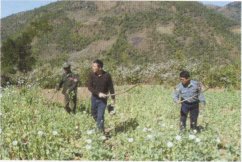
Mr. Chen Cunyi, Deputy Secretary General of NNCC and Deputy Director General of Narcotics Control Bureau of MPS, accompanied by his Myanmar counterparts, has a field survey on opium poppy cultivation in Northern Myanmar
In pursuant to relevant MOI signed between China and Myanmar, the Office of NNCC continued to entrust the Remote Sense Institute of China Science Academy to conduct remote sense survey on the opium cultivation in Northern Myanmar, the survey measures were enhanced and the accuracy rate of the survey was improved, and the survey impact became more obvious. In order to verify the survey images, the Office of NNCC, together with CCDAC of Myanmar, sent joint task forces to Northern Myanmar to conduct field survey. Between the winter of 2006 and the spring of 2007, the survey area in Northern Myanmar was 20.1 square kilometers, a number of suspected coordinates were informed to Myanmar side, which played an importance role in the eradication of illicit opium poppy in Northern Myanmar.
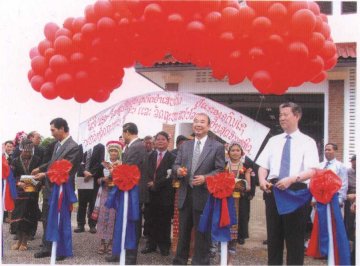
Mr. Yang Fengrui attends the delivery ceremony of Udomxay Drug Treatment Center in Lao PDR
NNCC continued to strengthen the alternative development cooperation with the Lao PDR. In July 2007, Mr. Yang Fengrui, Permanent Deputy Secretary General of NNCC and the Chinese Delegation were invited to attend the annual bilateral drug control cooperation meeting held in Udomxay Province, Lao PDR, Mr. Yang Fengrui presented himself in the opening ceremony of the Udomxay Drug Treatment and Rehabilitation Center donated by the Chinese Government, inspected a rubber cultivation project implemented by a Chinese enterprise. In 2007, the border areas of China had conducted 75 meetings or border talks with neighboring areas of Myanmar and the Lao PDR, launched 27 joint drug law enforcement operations, captured 283 drug suspects, seized 6443 kilograms of illicit drugs and 4795.3 kilograms of precursor chemicals.
Convening successfully the Seventh Ministerial Meeting of Signatory Parties to the 1993 Great Mekong Sub-region MOU on Drug Control Cooperation, participating actively in activities of ACCORD
In May 2007, the Seventh Ministerial Meeting of Signatory Parties to the 1993 Great Mekong Subregion MOU on Drug Control Cooperation was held in Beijing, it is the second time for the MOU Ministerial Meeting to be held in Beijing since 12 years ago the first MOU Ministerial Meeting was convened in this city. Mr. Zhou Yongkang, State Councilor and Commissioner of NNCC, attended the opening ceremony and delivered a welcome speech. The Ministerial Meeting adopted the "2007 MOU Beijing Declaration" and the updated "Sub-regional Action Plan", laid a future plan for the international drug control cooperation in this region. For 12 years, the MOU mechanism had played an active role in abating opium poppy cultivation, reducing drug harms, updating drug control outlooks and enhancing drug enforcement capabilities in this region. The mechanism was regarded as the model of sub-regional drug control cooperation.
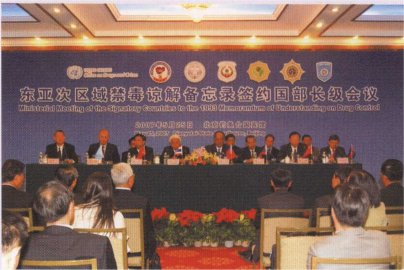
In 2007, NNCC participated actively in the meetings and activities of ASEAN and China Cooperative Operation in Response to Dangerous Drugs (ACCORD) and ASEAN Plus China, Japan and Korea Senior Official Meeting on Transnational Crimes (SOMTC + 3) Mechanism. In November, the Office of NNCC send a delegation to attend the 31st Meeting of Heads of National Drug Law Enforcement Agencies (HONLEA) and the task force meeting of ACCORD joint action against ATS crimes. Supported by these mechanisms and platforms, the drug control cooperation between China and ASEAN Countries made new and significant achievements. In June 2007, under the coordination of the Office of NNCC, the narcotics control agencies of Fujian Province took joint actions with the Philippine police and successfully cracked the "Cai Aishan Mega Transnational Drug Manufacture and Trafficking Case", 8 suspects were captured, a large-scale drug clan lab and two drug warehouses were destroyed, 180 kilograms of methamphetamine and almost 10 tons of precursor chemicals were seized. The successful uncovering of this case exerted wide influence in the international community and promoted the drug control cooperation between China and ASEAN countries into a new level.
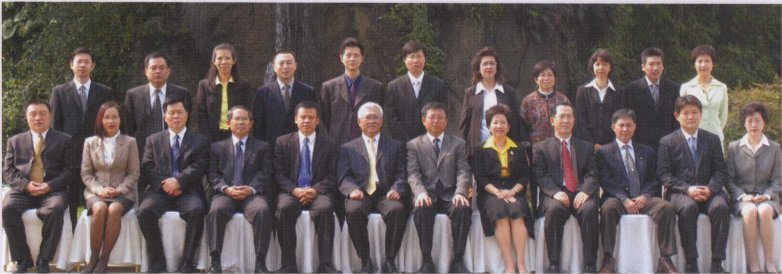
China-Thailand Drug Control Cooperation Meeting held in Xiamen of Fujian Province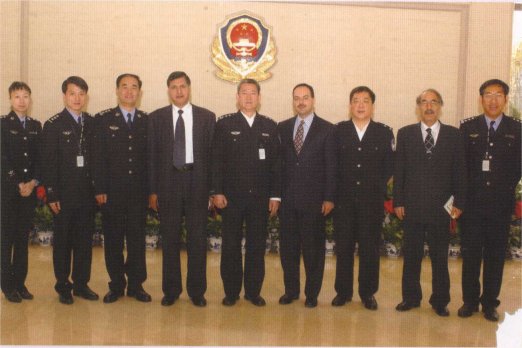
Mr. Yang Fengrui, together with Mr, Zhao Yu, Deputy Director General of Narcotics Control Bureau of MPS, meets with Afghan Ambassador to discuss drug control cooperation issues
Strengthening drug control cooperation with Afghanistan, Pakistan and other relevant countries, preventing effectively "Golden Crescent" drugs from flowing into China
Since drugs smuggled from "Golden Crescent"and neighboring areas were increasing, China strengthened the drug control cooperation with Afghanistan, Pakistan, other neighboring countries as well as member countries of Shanghai Cooperation Organization, established actively drug control channels and mechanisms, blocked "Golden Crescent" drugs from being smuggled to China through various channels. In July 2007, Mr. Zhang Xinfeng; Vice Commissioner of NNCC and Vice Minister of Public Security, visited Russia and held talks with the General Administration of Narcotics Control of Russia. Both sides discussed about how to strengthen bilateral cooperation in curbing the trafficking of drugs produced in Afghanistan. In September, Vice Minister Zhang Xinfeng welcomed Secretary of Ministry of Narcotics Control, Pakistan in Beijing, both sides agreed to nominate liaison officers on both central and border levels, strengthen joint drug enforcement, so as to fiercely suppress drug crims involving both sides and prevent drugs from being trafficked to China. According to relevant briefings, from January to October 2007, Pakistani law enforcement agencies had cracked more than 200 cases in which drugs were destined to China. With the close cooperation of Pakistan, Guangdong, Xinjiang and other places captured 16 foreign suspects and seized 24 kilograms of heroin.
Besides conducting effective bilateral cooperation, China also took an active part in multilateral drug control cooperation mechanisms sponsored by the United Nations, Shanghai Cooperation Organization and "Paris Pact", established a tight network to block drugs from "Golden Crescent". In 2007, NNCC representatives participated in a number of drug control meetings under the mechanisms of "Paris Pact" and Shanghai Cooperation Organization, exchanged information on the trafficking of "Golden Crescent" drugs and discussed issues about practical cooperation.
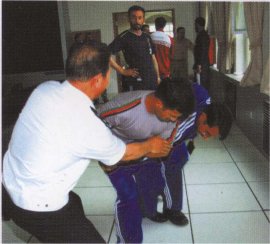
Training drug control officers of Afghanistan in Xinjiang Autonomous Region
Making new progresses on bilateral cooperation with the United States, Australia and EU
In order to implement the consensus reached between China and US when Mr. Zhou Yongkang, Commissioner of NNCC, visited US in 2006, Mr. Yang Fengrui, Permanent Deputy Secretary General of NNCC led a delegation to have a study visit in US and exchanged drug control experiences with the American side. During the visit, Mr. Yang Fengrui had business talks with Director of White House Office of National Drug Control Policy (ONDCP) and Administrator of Drug Enforcement Agency (DEA) of Department of Justice; met with co-chairs of US-China Working Group of US Parliament; visited drug treatment center and drug court of Miami and the West Multi-Agency Joint Intelligence Task Force. In April and June, NNCC sent two delegations respectively to attend two drug enforcement training courses. In January, China, US and Canada jointly cracked "0303" mega transnational cocaine trafficking case, captured 5 suspects in Canada and 6 in Guangdong. 25 kilograms of cocaine were seized in US. It was a typical case where China provided clues and coordinated US and Canada to make investigation. Besides, China and US cooperated well in investigating the case "Ye Zhenli".
After China and the Netherlands signed the MOU on precursor control in 2005, China and the Europe Union (EU) reached consensus on the draft of precursor control cooperation agreement in 2007. In July and December, based on the relevant agreement between China and Australia, the Australian Federal Police (AFP) provided two drug law enforcement training courses for the Chinese counterparts. The drug control cooperation between the two countries were strengthened.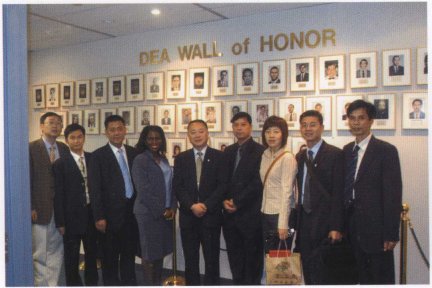
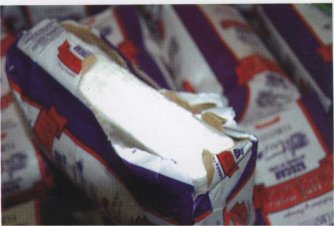
Evidence collection for Case "0303" in US and the seized cocaine
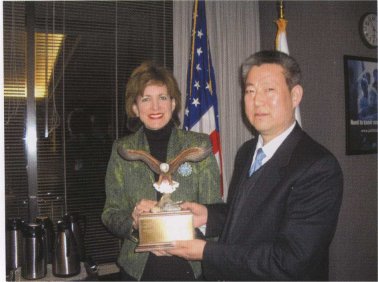
Mr. Yang Fengrui meets with Ms. Tandy, Administrator of DEA, Department of Justice, US
Attending multilateral drug control meetings, strengthening the training for foreign officers, taking an active part in regional drug control projects, enhancing the level of international cooperation
NNCC sent a delegation to attend the 50th session of Commission of Narcotics Drugs held in Vienna in March 2007, made speeches on the international drug situation, challenges of precursor control, and others. In February, the Delegation of NNCC attended the ADEC meeting held in Japan; in March, the representative of NNCC, made a presentation on the Asia-Europe Cooperation Meeting Combating Synthetic Drugs and its Precursors held in Paris of France, discussed cooperation issues with countries of EU. and in May, attended the IDEC meeting held in Spain.
The training for drug control officers of neighboring countries was strengthened. In 2007, China trained successively 131 drug control officers for Myanmar, Afghanistan, Pakistan, Tajikistan, Viet Nam, Democratic People's Republic of Korea (DPRK) and other countries. It was the first time for China to provide special drug control training for officers of Afghanistan, Pakistan, Tajikistan, Viet Nam and DPRK. On 27th and 29th June, coordinated by INCB, NNCC provided drug control training for 6 officers from the central government of DPRK, which was appreciated by the international community. Besides, NNCC strengthened cooperation with United Nations, participated actively in regional drug control project , such as "consolidating and strengthening border liaison officers mechanism in Southeast Asia" (I61), "enhancing awareness on drug harms for the people in East Asia" (G69), "precursor control cooperation in East Asia" (I63),"alternative development cooperation in East Asia", etc., which promoted the exchange of drug control experiences with relevant countries and the international community.
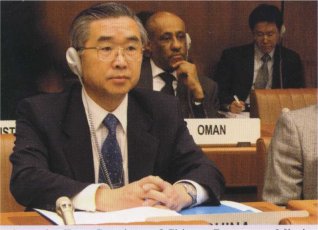
Ambassador Tang Guoqiang of Chinese Permanent Mission in Vienna attends the 50th CND meeting
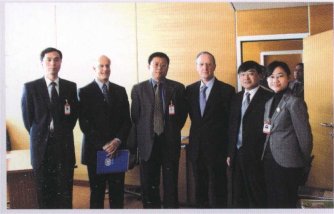
Mr. An Guojun, Deputy Director General of Narcotics Control Bureau of MPS, meets with Mr. Costa, ED of UNODC during CND meeting
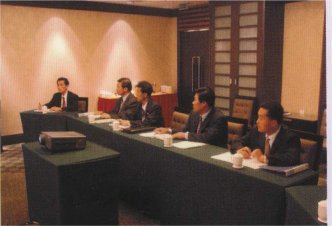
Training drug control officers of DPRK
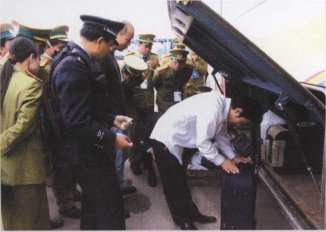
Training drug control officers of Myanmar and Lao PDR
| < Prev | Next > |
|---|












